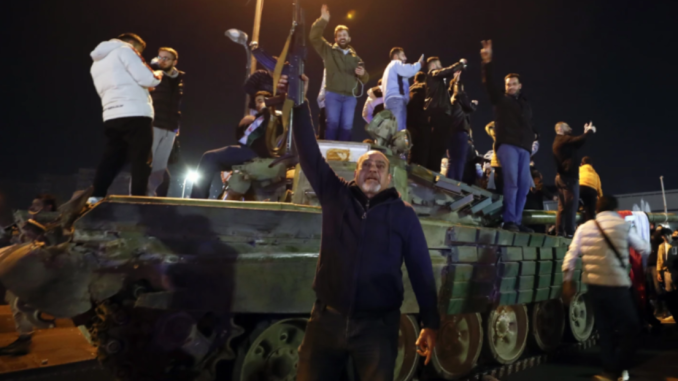Why Damascus fell without a fight.
by

The final blow to Assad, who has now fled Syria, just as Damascus has fallen without a fight to the rebels, was his abandonment by Iran on December 6. Not only did Iran fail to provide the military aid — troops and weapons — that Syria had been hoping for, but just two days before Damascus fell on December 8, Iran ordered all of its personnel, civilian and military, out of the country. Among them were two senior Al-Quds (IRGC) generals, who had to flee for their lives and sought refuge in Iraq. More on this Iranian pullout from Syria, that destroyed the morale of the troops in Damascus, can be found here: “Iran Begins to Evacuate Military Officials and Personnel From Syria,” Farnaz Fassihi and Ronen Bergman, New York Times, December 6, 2024:
Iran began to evacuate its military commanders and personnel from Syria on Friday, according to regional officials and three Iranian officials, in a sign of Iran’s inability to help keep President Bashar al-Assad in power as he faces a resurgent rebel offensive.
Among those evacuated to neighboring Iraq and Lebanon were top commanders of Iran’s powerful Quds Forces, the external branch of the Revolutionary Guards Corps, the officials said.
The move signaled a remarkable turn for Mr. al-Assad, whose government Iran has backed throughout Syria’s 13-year civil war, and for Iran, which has used Syria as a key route to supply weapons to Hezbollah in Lebanon.
Guards personnel, some Iranian diplomatic staff, their families, and Iranian civilians were also being evacuated, according to the Iranian officials, two of them members of the Guards, and regional officials. Iranians began to leave Syria on Friday morning, the officials said, speaking on condition of anonymity to discuss a sensitive issue….
The Syrian army had been demoralized for quite some time. But no one expected that its troops would crumble all over Syria in less than two weeks. Its troops had long been underpaid. Its officers rose not through merit, but through the connections they had to the ruling Ba’athist party. Alawites — the sect to which Bashar Assad belongs — enjoyed preferment over all other groups. The army’s forces first melted away when the HTS rebels appeared at the gates of Aleppo, Syria’s second largest city and its commercial hub, taking control of the entire city within three days. Victory came even more quickly for the rebels in Hama. And in Homs, even before the rebels entered the city, thousands of Assad loyalists — his fellow Alawites — including army members, fled the city for the Alawite stronghold on the coast. The rebels then seized Homs, cutting Damascus off from the coast where Assad’s most loyal troops had been stationed, in Tartus and Latakia. In southern Syria, a different group of rebels took over in one day the city of Daraa and its military base. This left the Syrian army even more demoralized, following these swift victories by these seemingly unstoppable enemies.
Another reason for the army’s demoralization was the wretched salaries soldiers have been receiving. In a desperate act to improve morale, the Syrian government announced a 50% increase in army salaries, but that came too late to make a difference in soldiers’ attitudes. Given the string of rebel successes, that rise in salary did not persuade troops in the army to stay fighting when the result was now certain defeat. In a sign of mass despair, two thousand Syrian army troops, unwilling to fight, fled into Iraq.
Right now, early on December 8, the war is already over. Damascus has fallen to the rebels, of whom the largest component is Hayat Tahrir al-Sham, but there are other rebel groups as well, including the secular and democratic forces of the Free Syrian Army.
“Syria is at the verge of collapse and we are watching calmly,” said Ahmad Naderi, an Iranian Parliament member, in a post on social media on Friday. He added that if Damascus fell, Iran would also lose its sway in Iraq and Lebanon, saying, “I don’t understand the reason for this inaction but whatever it is, it’s not good for our country.”
Now, two days later, Syria has fallen to the jihadis, and as Ahmad Naderi has said, the rebel victory will cause Iran to “lose its sway in Iraq and Lebanon.” Iran will no longer have an ally in Syria. The Sunni jihadis see Iran as the enemy, the malevolent power that helped keep the hated Bashar Assad in power for so long. They feel just as strongly about Hezbollah, that sent troops during the civil war to help Assad. The victorious rebels won’t want to help facilitate the delivery of Iranian weapons to Hezbollah in Lebanon.



Leave a Reply
You must be logged in to post a comment.